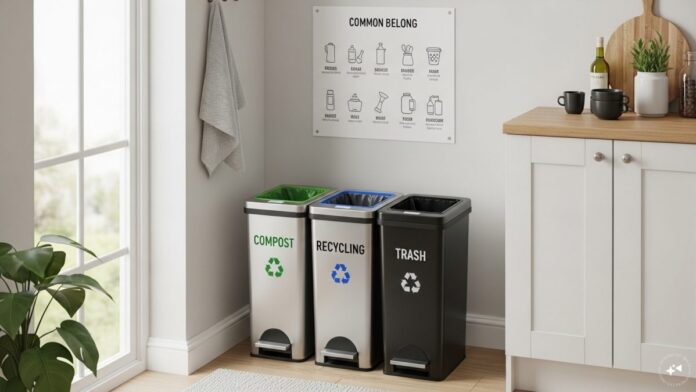Last Updated:
Like building wealth, sustainability thrives on small, consistent action. A single house using a three-bin system for a year can divert over half a tonne of waste from landfills.
Use a three-bin system to segregate waste efficiently. (AI Generated Image)
Every year, World Environment Day serves as a calendar nudge, like a Facebook birthday reminder, to momentarily reflect on our planet before slipping back into business as usual. But this year’s theme, plastic pollution, isn’t something we can afford to forget. Our landfills, much like unpaid credit card bills, are quietly collecting interest, now in the form of microplastics found in our water, food, and even air.
According to the Scaling Our Waste Mountains Report (Godrej Consumer Products & Dasra, 2023), a staggering 70–80% of urban waste in India is unsegregated, meaning most of it can’t be recycled and ends up in landfills. This also puts millions of waste workers at risk, exposing them to hazardous waste without protection. The good news? A major part of the solution begins right at home.
Small, daily segregation habits can create massive ripple effects, just like disciplined financial saving. As promoted under the Government of India’s Mission LiFE (Lifestyle for Environment), mindful, everyday actions like waste segregation are some of the most accessible and powerful ways to contribute to sustainability.
1. Use the Three-Bin Method
Just like a smart investor divides income into needs, savings, and risk, your waste can be sorted into wet (organic), dry (recyclable), and hazardous. This simple step enables efficient processing and reduces costs and contamination across the waste chain. As per NITI Aayog’s 2021 guidelines, segregation significantly boosts recyclability and reduces both transportation and landfill volumes.
2. Compost Your Kitchen Waste
Food waste makes up over half of an urban Indian dustbin. When dumped, it releases methane and pollutes groundwater. But composting transforms it into nutrient-rich fertiliser for your garden or terrace farm.
3. Rinse Before You Recycle
Dry waste like paper and plastic holds value, but only if it’s clean and uncontaminated. A quick rinse of plastic containers ensures higher resale and recovery rates. Dirty recyclables, on the other hand, end up in landfills. Consider it the environmental equivalent of pruning underperforming assets from your investment portfolio.
4. Don’t Mix Your Waste Portfolio
When you mix waste, you destroy its value. It disrupts processing, increases landfill load, and puts over three million informal workers, many without gloves or safety gear, at health risk. Mixed waste isn’t just a processing issue; it’s an ethical one.
5. Support the People Behind the Process
India’s informal waste-pickers recover up to 30% of all recyclables, yet lack formal recognition or resources. Cities like Pune, through the SWaCH model, have shown that integrating these workers improves both waste recovery and livelihoods. Supporting local collection drives and cooperative models is a direct investment in environmental and social equity.
view comments
- Location :
Delhi, India, India
Read More

